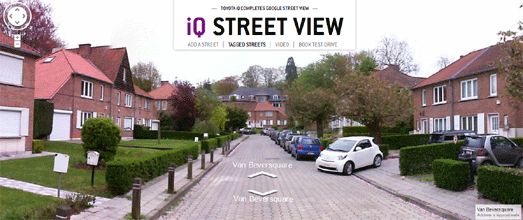The Google Maps of the Week
Over the last couple of years there has been a number of clever promotional campaigns by companies using the Google Maps API (often taking advantage of Google Maps Street View imagery). Two of my favorite maps featured on Google Maps Mania this week were from Toyota and Moët & Chandon.
Both companies have managed to create campaigns with Google Maps that reflect some of the core values associated with their products and at the same time create interactions with potential customers.

Toyota has come up with one of the best Google Maps based promotional campaigns yet. To help promote the car the company are driving a Toyota IQ around with a 360 degree panoramic camera rig strapped to the roof. They are then capturing Street View images and filling in all the blanks on Google Maps.
The campaign, currently running in Belgium, allows anyone to report a street that doesn't have Street View on the Toyota IQ - Street View Google Map. The Toyota IQ then travels to the street, captures the Street View images and adds them to their Toyota IQ map.

If you can't afford to whisk the love of your life off for a romantic weekend in Paris you could try sending her a romantically tagged Street View image from the city instead. You never know it just might work.
Tag Your Love in the Streets is a nice Street View based promotional campaign by Moët & Chandon. Using the application you can select a Street View image from anywhere in the world and then add your own message. You can add text to the image and decorate the scene with a number of romantically themes images, such as flowers, hearts or a bottle of champagne.

The island of Sumatra in Indonesia has lost almost 50% of its tropical rainforest in the last 35 years. The World Wildlife Fund, Eyes on the Forest and Google Earth Outreach have joined forces to create a Google Map of land cover, land use, and land users in Sumatra.
Eyes on the Forest: Sumatra allows users to explore data about the island's conservation values, forest diversity and wildlife. The aim of the map is to increase transparency about the threats to the Sumatran environment and identify the drivers of deforestation and habitat destruction.
It is possible to view a number of data layers on the map, including the dwindling rainforest cover over the last 35 years, wildlife ranges, protected areas and natural carbon stores.
Both companies have managed to create campaigns with Google Maps that reflect some of the core values associated with their products and at the same time create interactions with potential customers.

Toyota has come up with one of the best Google Maps based promotional campaigns yet. To help promote the car the company are driving a Toyota IQ around with a 360 degree panoramic camera rig strapped to the roof. They are then capturing Street View images and filling in all the blanks on Google Maps.
The campaign, currently running in Belgium, allows anyone to report a street that doesn't have Street View on the Toyota IQ - Street View Google Map. The Toyota IQ then travels to the street, captures the Street View images and adds them to their Toyota IQ map.

If you can't afford to whisk the love of your life off for a romantic weekend in Paris you could try sending her a romantically tagged Street View image from the city instead. You never know it just might work.
Tag Your Love in the Streets is a nice Street View based promotional campaign by Moët & Chandon. Using the application you can select a Street View image from anywhere in the world and then add your own message. You can add text to the image and decorate the scene with a number of romantically themes images, such as flowers, hearts or a bottle of champagne.

The island of Sumatra in Indonesia has lost almost 50% of its tropical rainforest in the last 35 years. The World Wildlife Fund, Eyes on the Forest and Google Earth Outreach have joined forces to create a Google Map of land cover, land use, and land users in Sumatra.
Eyes on the Forest: Sumatra allows users to explore data about the island's conservation values, forest diversity and wildlife. The aim of the map is to increase transparency about the threats to the Sumatran environment and identify the drivers of deforestation and habitat destruction.
It is possible to view a number of data layers on the map, including the dwindling rainforest cover over the last 35 years, wildlife ranges, protected areas and natural carbon stores.


Комментарии